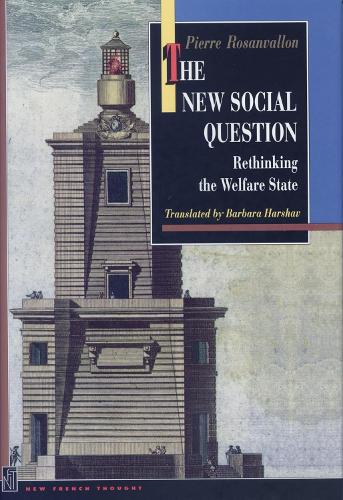
The New Social Question: Rethinking the Welfare State
(Paperback)
Publishing Details
The New Social Question: Rethinking the Welfare State
By (Author) Pierre Rosanvallon
Translated by Barbara Harshav
Princeton University Press
Princeton University Press
28th August 2024
United States
Classifications
Professional and Scholarly
Non Fiction
Social and ethical issues
Central / national / federal government policies
361.65
Physical Properties
Paperback
176
Width 156mm, Height 235mm
Description
How social and intellectual changes undermine our justifications for the welfare state
The welfare state has come under severe pressure internationally, partly for the well-known reasons of slowing economic growth and declining confidence in the public sector. According to the influential social theorist Pierre Rosanvallon, however, there is also a deeper and less familiar reason for the crisis of the welfare state. He shows here that a fundamental practical and philosophical justification for traditional welfare policiesthat all citizens share equal riskshas been undermined by social and intellectual change. If we wish to achieve the goals of social solidarity and civic equality for which the welfare state was founded, Rosanvallon argues, we must radically rethink social programs.
Rosanvallon begins by tracing the history of the welfare state and its founding premise that risks, especially the risks of illness and unemployment, are equally distributed and unpredictable. He shows that this idea has become untenable because of economic diversification and advances in statistical and risk analysis. It is truer than ever beforeand far more susceptible to analysisthat some individuals will face much greater risks than others because of their jobs and lifestyle choices. Rosanvallon argues that social policies must be more narrowly targeted. And he draws on evidence from around the world, in particular France and the United States, to show that such programs as unemployment insurance and workfare could better reflect individual needs by, for example, making more explicit use of contracts between the providers and receivers of benefits. His arguments have broad implications for welfare programs everywhere and for our understanding of citizenship in modern democracies and economies.
Reviews
"Of all the new French liberals, Pierre Rosanvallon has the most to say about issues of great concern to Americans. The New Social Question explores with great subtlety the core question of social solidarity and its meanings, in the present and for the future. It is an essential meditation on what can and should be done with the welfare state."--Sean Wilentz, Princeton University
Author Bio
Pierre Rosanvallon is Professor of History and Political Philosophy and Director of the Centre de Recherche Politique Raymond Aron at the cole des Hautes tudes en Science Sociales in Paris. He is the chairman of Fondation Saint-Simon, a think tank that produces ideas and projects for the renewal of the left in France. His previous books include Le peuple introuvable, Le Sacre de Citoyen, and La Crise de l'tat Providence. Nathan Glazer is Professor of Education and Sociology, Emeritus, at Harvard University.
